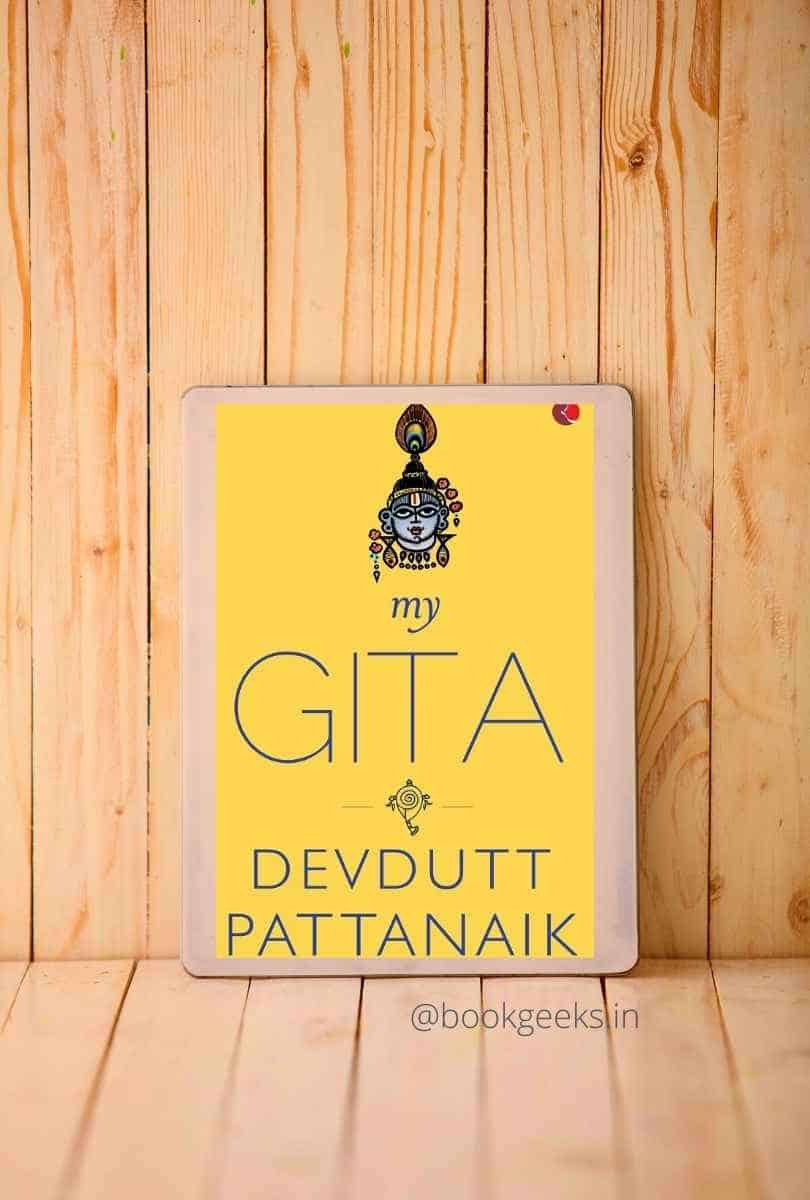SUBJECT: 4/5 RELEVANCE: 5/5 RESEARCH: 5/5 WRITING STYLE: 3.5/5
“Those who believe in karma do not blame. They do not judge. They accept that humans live in a sea of consequences, over which there is limited control. So they accept every moment as it is supposed to be. They act without expectation.”
― Devdutt Pattanaik, My Gita
This book, written by one of India’s most popular mythologists Devdutt Pattnaik has an interesting title, ‘My Gita’. One look at the title and you know that the book would be philosophical and full of wisdom. And as you read it, this becomes more evident than ever but more than that, the book has a very practical approach to life and living. It teaches how one can have a balance in their life by using the lessons it imparts.
At the beginning of the book, the author states the reasons behind choosing this particular title. Although this book is not his version of the Bhagavad Gita or even the analysis of the Bhagavad Gita, the reasons stated are good enough to carry weight and are interesting as well.
The author has written about the history of the Gita and the many versions of it, and which version is mostly followed. The book further delves into concepts like the feministic approach, the translations, the retellings, the commentaries, and such varied aspects revolving around the Bhagavad Gita and its history have been mentioned in the book.
With a beautiful drawing right at the beginning, the author maintains that the book is about exploring the eighteen themes of the Bhagavad Gita. He also clarifies that the sequence of the themes of the book and the actual Bhagavad Gita may vary.
In the first theme of the book, Devdutt writes about not being judgemental. It shows the scene on the battlefield, just when the battle was about to begin and how Krishna solves the confusion of Arjuna by sharing about the sufferings of his loved ones. This is portrayed beautifully in the book, especially in the context of refraining from being judgemental.
“Krishna replies that nothing is wasted or destroyed in the cosmos. All efforts are recorded and they impact future lives. Knowledge acquired in the past plays a role in the wisdom of future lives.”
– Devdutt Pattanaik, My Gita
The author elucidates how one should always thrive to become less and less judgemental with each passing day, as judgments make things or situations either good or bad. And without the cloud of judgment shrouding our vision, the world appears as it really is.
The second theme of the book is about the cycle of birth and rebirth and the immortal Atma. The author gives some wonderful life lessons, sharing that everyone here has come before and will come again and that the Atma is immortal.
In the third theme of My Gita, the author explains and demystifies how everyone experiences life differently. While in the fourth one, he emphasizes the importance of every individual seeking meaning in life, seeking their purpose in life.
The fifth theme gives us insights into karma and its consequences. It is imperative that human beings know that the world runs on basic principles only, no matter how modern it becomes. One of the basic principles it teaches is how Karma would always have consequences, either soon or in the distant future. So, we ought to be careful with our actions, for as we sow, so shall we reap.
In addition to the above themes, the author has portrayed stories from the Bhagavad Gita engagingly and effectively. These stories that capture the essence of dharma form the content of the sixth theme of the book. In the seventh theme, the author writes about Yagna in an elaborative manner.
In this way, the author has explained a different aspect of life and wisdom in all the eighteen chapters of the book. The book has lucid language and thus everyone can read and understand it easily. The illustrations, the writing, and the inventive storytelling together make My Gita an engaging and knowledgeable read.
Can’t wait to read it? Buy your copy of My Gita using the link below.
